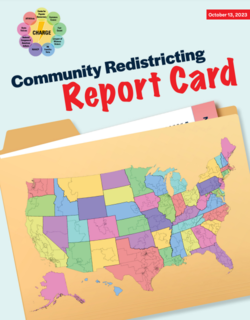Making the grade: New report grades states on their 2020 redistricting processes — including whether they ended prison gerrymandering
Report highlights growing bipartisan support for counting incarcerated people in their home communities.
by Mike Wessler, November 9, 2023
A new report from CHARGE (the Coalition Hub for Advancing Redistricting & Grassroots Engagement), a coalition of good-government groups working to improve the redistricting process, makes clear that ending prison gerrymandering has quickly gone from an emerging issue done by only a handful of states, to being among the gold-standard redistricting practices.
Prison gerrymandering is a problem created because the Census Bureau counts incarcerated people as residents of the wrong place — a prison cell — rather than in their home communities. When state and local governments use this data to draw new government districts every decade, they inadvertently give more political clout to districts that contain prisons, at the expense of everyone else.
The report is based on hundreds of interviews and surveys that members of CHARGE conducted with advocates and organizations involved in the redistricting process in each state. It gave every state’s redistricting process a grade from “A-” to “F”. In addition to addressing prison gerrymandering, these grades are also based on best practices related to transparency, opportunities for public input, the willingness of decision-makers to draw districts based on that input, adherence to nonpartisanship, empowerment of communities of color, and policy choices.
Several key findings related to prison gerrymandering emerge from the report:
- Prison gerrymandering reforms have become increasingly nonpartisan: The report notes that in Montana, which it gave a B grade, “(d)espite a polarized atmosphere in which commissioners of different parties were unable to agree on final maps, the (Montana Districting and Apportionment Commission’s) vote to end prison gerrymandering was unanimous and bipartisan.”
- States that addressed prison gerrymandering received some of the highest grades: 15 states received a grade of B- or higher; seven of them (California, Massachusetts, Colorado, Montana, Nevada, New Jersey, Washington) had already taken action to address prison gerrymandering. Another state in this group, Maine, has since also passed legislation for the 2030 redistricting cycle.
This report follows a report by the National Conference of State Legislatures (NCSL), which looked at states’ experiences ending prison gerrymandering during the 2020 redistricting cycle. In an accompanying briefing, the organization notes that ending prison gerrymandering is “the fastest-growing trend in redistricting.”
While the best way to address prison gerrymandering is for the Census Bureau to change how it counts incarcerated people, these reports show that states can and should take action to address the problem on their own. And, even though the 2030 redistricting process is still several years away, now is the ideal time for them to do so. Passing legislation now will ensure states have the data and process in place to take on this task after the 2030 count, it will also add their voices to the growing chorus calling on the Census Bureau to change its outdated policy.
These two reports, when taken together, highlight the need — and growing bipartisan calls — for the Census Bureau to finally take steps to end prison gerrymandering nationwide. As the 2030 count draws closer, it remains to be seen whether the Bureau will get an A or an F on this easy test.




